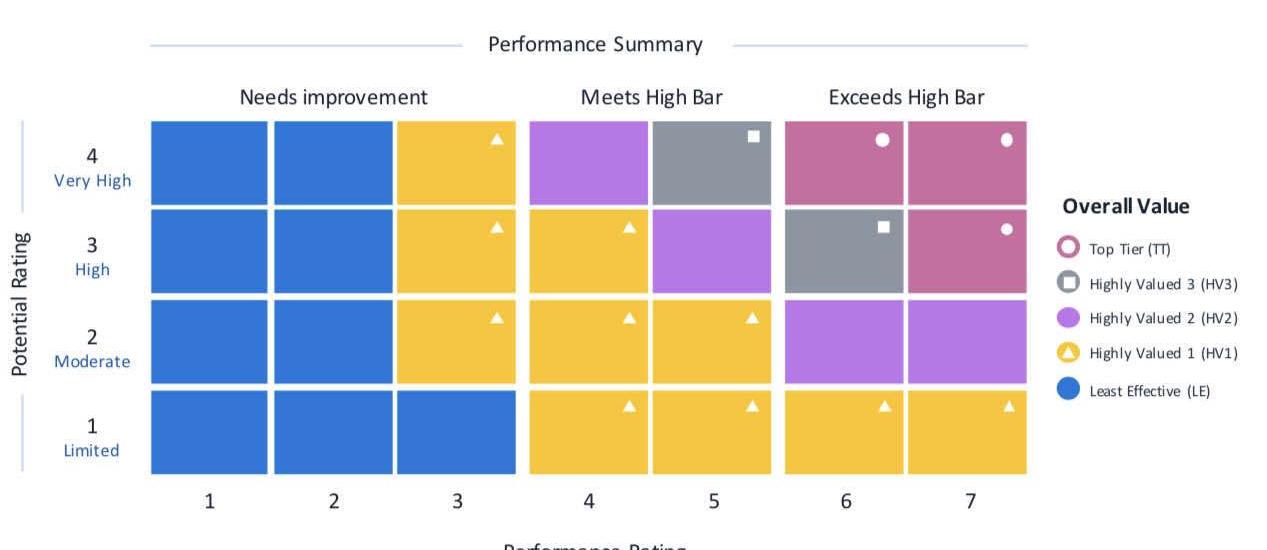
Amazon
Amazon.com, Inc. is an American multinational technology company which focuses on e-commerce, cloud computing, and much more. Headquartered in Seattle, Washington, it has been referred to as "one of the most influential economic and cultural forces in the world".
Performance Review
Evaluation
See relevant discussions involving Amazon engineers on Taro.
Engineers are actually evaluated on two dimensions: performance and potential. Performance is backward-looking: what did you achieve in the past few months? Potential is forward-looking: how will you perform in the future, given your ambition and growth rate?
Managers decide a rating for each engineer on these two dimensions, which results in a final "performance summary" (described in the calibration section):

Managers make determinations about potential based on various criteria like willingness to act on feedback, initiative to improve workflows, and demonstrations of strategic thinking.
Evaluation at Amazon is coupled to their 16 leadership principles (LPs):
- Customer Obsession
- Ownership
- Invent and Simplify
- Are Right, A Lot
- Learn and Be Curious
- Hire and Develop the Best
- Insist on the Highest Standards
- Think Big
- Bias for Action
- Frugality
- Earn Trust
- Dive Deep
- Have Backbone; Disagree and Commit
- Deliver Results
- Strive to be Earth’s Best Employer
- Success and Scale Bring Broad Responsibility
Feedback
Self Feedback
Mention the Amazon LPs you championed across the cycle to add more weight to your self-review.
The input is free-form, but you should anchor your self-assessment against the Amazon LPs.
Manager Feedback
Your manager's feedback is very important because they will stack rank you. All of the feedback is collated under your director level.
Peer Feedback
Amazon is big on collaboration, so you can request feedback from a huge amount of peers. There is effectively no limit to the amount of peers you can get feedback from - You can go as high as 15-30 peers.
You should reach out to a minimum of 5-6 peers for feedback, even if you're SDE 1.
When someone requests peer feedback from you, you write about the following 2 categories:
- Superpowers
- Areas of improvement
Make sure to be concise with your peer feedback as you only have 60 words per section!
On top of the above 2 fields, you can also choose up to 3 options each for:
- Amazon LPs your peer championed well
- Amazon LPs your peer could have represented better
This means that you can tie up to 6 total LPs to your peer feedback. These selections are made across checkboxes.
Feedback Visibility
You will be able to see your peer feedback with names removed. However, this can be reverse engineered based on the author's writing style. Write peer feedback with the expectation that the peer will know the feedback is coming from you.
Calibration
Amazon targets to cut the bottom 6% of its engineers every performance cycle for low performance. 💀
Manager Role
Amazon is different than most other companies because there are 2 different ratings:
- The rating you see and get (Exceeds, Meets, Needs Improvement)
- The real behind-the-scenes rating, which is generated by your manager and other engineering leadership
The real rating is generated through a separate process called OLR (Organization And Leadership Review).
Here are the real ratings:
| Rating | Maps To | Description |
|---|---|---|
| TT - Top Tier | Exceeds | This means that you are a rockstar for your level, massively exceeding expectations. You generally need to be here to get promoted. Only 1-2% of engineers get this rating. |
| HV3 - High Value 3 | Exceeds | This means that you're doing extremely well. |
| HV2 - High Value 2 | Meets | This means that you're doing quite well, exceeding expectations. |
| HV1 - High Value 1 | Meets | This is the average rating. 35-40% of engineers are placed within this bucket. |
| LE - Least Effective | Needs Improvement | This means that you're doing poorly, not meeting expectations at your level. 10% of engineers get this rating every cycle. |
Compensation
Salary
Amazon's frugality shows here as your compensation doesn't increase significantly with a good performance review rating.
| Rating | Salary Increase (%) |
|---|---|
| Exceeds | 2-4% |
| Meets | 1-2% |
| Needs Improvement | 0-1% |
If you want a significant compensation increase, you need to get a promotion. A promotion often increases your base salary by at least 30%.
Equity
Amazon's offers equity to employees over a 4 year period, but the vesting schedule is biased toward the end of the 4 year grant. Generally you'll get a signing bonus over years 1 and 2 to "make up" the initial TC difference.
Amazon defines a "target comp" for each level which dictates your pay in subsequent years. If your previous equity grants have appreciated significantly in value, your equity refresh could be 0!

Bonus
Unlike most other Big Tech companies, Amazon doesn't pay out a cash bonus.
TC Boosting Fun Facts 💸
Amazon shells out the big bucks retaining top-caliber talent with "dive and save", which can increase your TC by $75k+. However, this is really hard to attain as it requires VP approval.
Before, you could "boomerang", leaving Amazon for another company and then quickly come back to Amazon with a better package. However, policy recently changed so that boomerangs would get the same package they had before.
Performance Improvement Plan
Rating Risk
There is a high risk of getting a PIP if you get an NI (Needs Improvement) rating.
There is a target for 10% of engineers to receive the NI rating each cycle.
Process
PIPs are effectively a death sentence at Amazon. 🪦
If you're a low performer, the process is as follows:
- Focus - This is also called a "Development Plan" or a "Development List". 10-15% of each organization is put into "Focus" each cycle. You are given a well-defined project that's usually around a month to execute.
- Pivot - If you don't succeed in "Focus", you are given the opportunity to exit the company and take a severance package or be put on a PIP (Performance Improvement Plan).
- PIP - You're given an aggressive project to complete that's also well-defined. If you don't succeed, you are fired. Most Amazonians on PIP do not survive.
Promotion
Promotion Guide
Requirements
You should be operating at 80%+ of the next level's guidelines to have a real case for your promotion.
You need to write a summary of your work for your promotion packet. The summary needs to include information about the following 5 core scopes of work:
- Scope and influence
- Ambiguity
- Technical complexity
- Execution
- Impact
There is another section where you need to talk about how your work corresponds to Amazon's LPs; however, this section isn't as important as the others.
You need a minimum of 4 peer feedbacks to support your promotion case, but 6+ is recommended.
Documentation requirements
You should always be generating a large paper trail with every project you ship at Amazon. This saves you a lot of time putting together your promotion case as you don't need to write everything from scratch - You can simply compile everything you already have.
The documentation requirements at Amazon are pretty onerous:
- SDE 1 -> SDE 2 promotion takes 5+ pages of documentation.
- SDE 2 -> SDE 3 promotion takes 15+ pages of documentation (!!!).
Rating
You generally need a TT (Top Tier) or HV3 (High Value 3) rating to get promoted.
What Blocks Promotions?
- SDE 1 -> SDE 2 promotions are generally held back because they're lacking in technical complexity.
- SDE 2 -> SDE 3 promotions are generally held back because of lack of scope, influence, and impact.